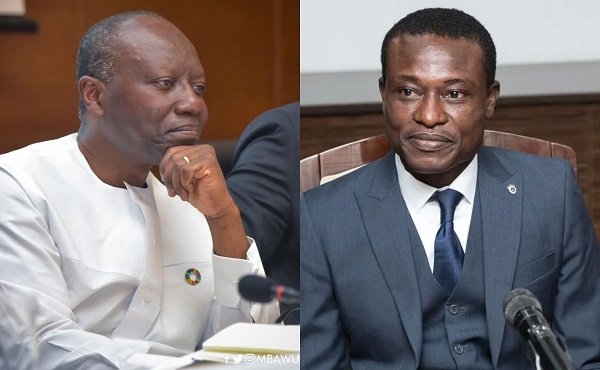News
OSP to charge former finance minister Ken Ofori-Atta and others over SML deal

The Office of the Special Prosecutor (OSP) has completed its investigation into the controversial contract between Strategic Mobilization Ghana Limited (SML) and the Ghana Revenue Authority (GRA) and will soon begin legal action against several key figures, including former Finance Minister Ken Ofori-Atta.
At a press briefing in Accra today, Special Prosecutor, Kissi Agyebeng announced that Mr. Ofori-Atta and six others will be charged with various corruption and corruption-related offenses before the end of November 2025.
The individuals to be charged include Ken Ofori-Atta, former Minister for Finance; Ernest Akore, chef de cabinet
to the former Finance Minister; Emmanuel Kofi Nti, former Commissioner-General of GRA; Amishadai Owusu-Amoah, former Commissioner-General of GRA; Isaac Crentsil, former Commissioner of the Customs Division of GRA; Kwadwo Damoah, former Commissioner of Customs and current Member of Parliament for Jaman South; and the General Manager of SML Ghana Limited.
According to Mr. Agyebeng, the investigation found that the government’s agreement with SML was “unnecessarily deceptive” and caused significant financial loss to the state.
The OSP described parts of the deal as misleading, particularly the conversion of SML’s payment from U.S. dollars to Ghana cedis, which the OSP said disguised the true cost.
He revealed that the fixed monthly fee agreed upon in the November 2024 addendum amounted to the cedi equivalent of $1.43 million (₵16.29 million) per month, inclusive of all taxes, at the Bank of Ghana’s exchange rate at the time.
The OSP said the GRA has not made any payments to SML since December 2024 due to the ongoing investigation.
Mr. Agyebeng further stated that the OSP will seek to recover funds lost to the state as a result of the deal.
In addition, SML will be made to refund ₵125 million, described as “unjust enrichment” money the company received unfairly from the state.
Explaining the decision, the Special Prosecutor said the refund amount was calculated based on the principle of quantum meruit, a legal concept that ensures a person receives fair compensation for benefits conferred, even if the underlying contract is invalid.
He explained that although some of SML’s contracts were unlawfully awarded and services were only partly performed, the company had invested in infrastructure such as setting up and maintaining offices.
The OSP therefore adjusted the refund to reflect the fair value of work done.
The Special Prosecutor also said his office has initiated processes to recover the full financial loss caused to the state from the individuals involved.
Mr. Agyebeng emphasised that the OSP remains committed to holding all public officials and private actors accountable for corruption and abuse of office.
The SML deal, signed under the Ministry of Finance and GRA, was intended to enhance revenue assurance in the petroleum downstream sector but has faced public backlash following allegations of inflated payments and poor performance.
By: Jacob Aggrey
News
Damango wages war on shisha smoking among minors

Troubled and anxious citizens in Damongo of the Savannah Region have expressed concerns about the number of young people, believed to be under the age of 18, involved in ‘shisha’ smoking in pubs and drinking spots within the township.
Eyewitnesses say the minors were seen patronising nightlife venues, where Shisha smoking happen in the open.
The situation has sparked renewed public concern over the enforcement of child protection laws and regulations governing the operations of entertainment centres in the municipality and country as a whole.
An eyewitness, who spoke to The Spectator on conditions of anonymity for security reasons, noted that the situation was becoming increasingly common.
“This is not a one-off incident. It is becoming very common, but residents like us cannot openly report or speak about it because our lives will be at risk,” he said.
Under Ghanaian law, minors were prohibited from patronising Shisha.
Public health experts have consistently warned that shisha use exposes users to harmful substances that can negatively affect brain development, respiratory health, and overall well-being, particularly among young people.
The residents believe the alleged incidents point to broader challenges relating to youth supervision, substance abuse, and weak enforcement of existing regulations and have called on municipal authorities, security agencies, and regulatory bodies to intensify monitoring of pubs and entertainment centres to ensure compliance with the law.
In an effort to address the menace, Mr Salisu Be-Awurbi, the Savannah Regional Minister, has led public education campaigns, engaged security agencies, and supported enforcement actions to address the rising use of illicit substances in the region.
Wura Kelly Seidu Boresah I, the Chief of Damongo, has also called on all stakeholders including parents, community leaders, institutions, and young people to actively support efforts to curb drug abuse, warning that the rising consumption of hard drugs poses a serious health threat to the future of the youth in the Savannah Region.
He also cautioned individuals involved in the sale and distribution of illicit drugs to immediately desist from the practice, stressing that offenders will face arrest and prosecution in accordance with the law.
From Geoffrey Buta, Damongo, Savannah Region
Join our WhatsApp Channel now!
https://whatsapp.com/channel/0029VbBElzjInlqHhl1aTU27
News
Ga Mantse endorses initiative to end domestic voilence

Dr Theresa Baffour, an advocate for ending violence and Chief Executive Officer (CEO) of SAHM SAHW Foundation, has said that society plays a critical and pivotal role in breaking the cycle of domestic violence.
According to her, domestic violence is a major contributor of making women, who are mostly the victims, mentally derailed and unable to engage in economic activities.
She said this when the foundation called on the Ga Mantse, Nii Tackie Teiko Tsuru II, to solicit support for the initiative by the “Strong and Healthy Minds, Strong and Healthy Women” (SAHM SAHW) to combat domestic violence within the Ga State.
The visit was occasioned by the fact that domestic violence cases have become quite prevalent in the Ga communities and is retarding growth.
According to her, the canker was an impediment to national development because the victims were usually tortured and would have to go through series of therapies to return to the right state of mind.
Dr Baffour mentioned that Gender-Based Violence (GBV) places a mental toll on women, and was, therefore, important to break the cycle through comprehensive mental health support, crisis intervention and empowerment programmes in communities with high rates of GBV.
This intervention, she underscored, would help in empowering the denigrated victim of domestic violence to soundly heal, build and thrive.
Dr Baffour added that the initiative would provide holistic, trauma-informed mental health care and advocacy for young women affected by domestic violence.
According to her, the above statement would create safe spaces for healing and equipping them with entrepreneurial skills for renewed hope and empowered life.
The Ga Mantse pledged his support for the laudable initiative to combat domestic violence and also acknowledged the need to address it in the Ga State.
Further endorsement came from Justice Julia Naa-Yarley Adjei Amoah, Chief of Staff at the Office of the Ga Mantse, as she commended the team of SAHM SAHW Foundation for taking a bold step to end the canker in the Greater Accra.
She added that it was a step in the right direction to save vulnerable women from torture, stress and emotional abuse.
By Alfred Nii Arday Ankrah














